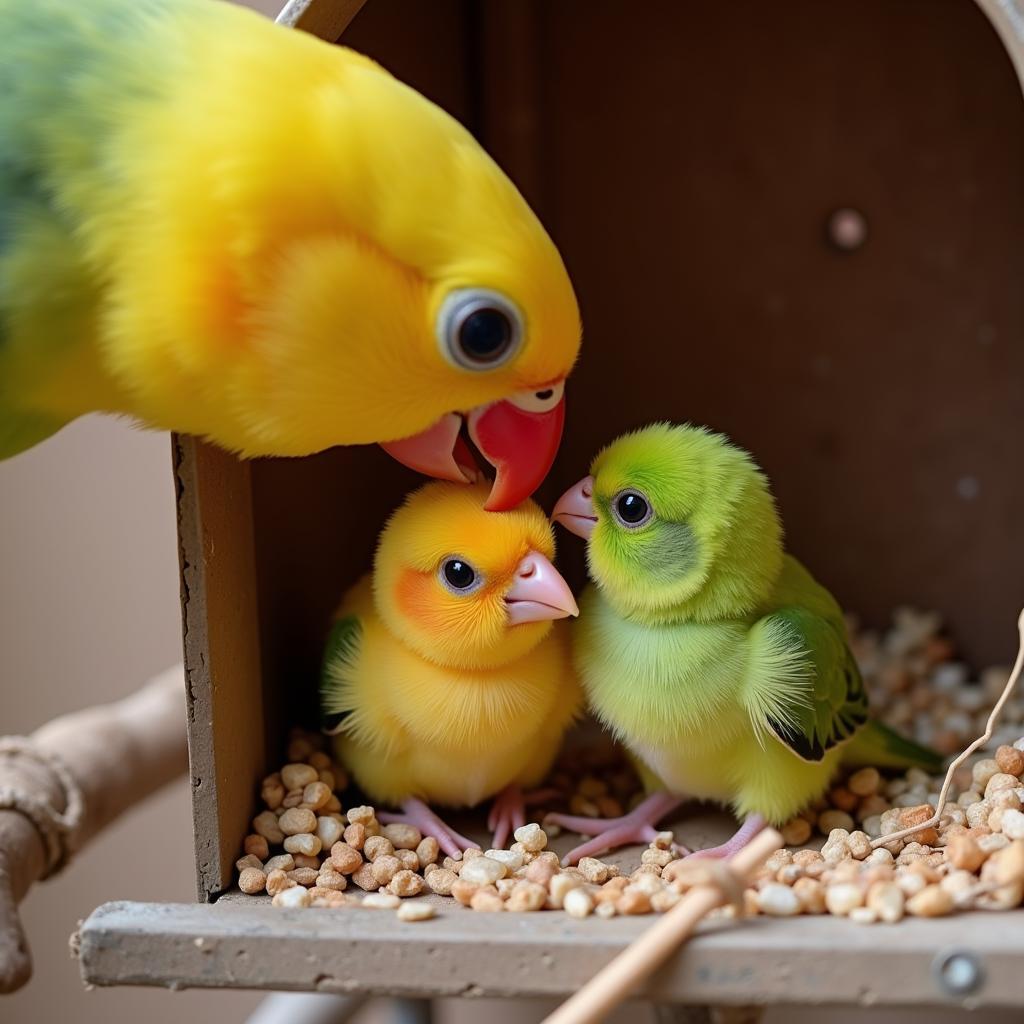About African Lovebirds Breeding
African lovebirds breeding is a fascinating and rewarding experience. Whether you’re a seasoned breeder or just starting out, understanding the nuances of these vibrant birds’ reproductive cycle is crucial for success. This comprehensive guide will delve into everything you need to know about African lovebird breeding, from choosing the right pair to raising healthy chicks.
Lovebirds, known for their vibrant plumage and affectionate behavior, are popular companion birds. Many enthusiasts venture into breeding these charismatic creatures, drawn by the joy of witnessing new life and the unique challenges it presents. For successful African lovebird breeding, a thorough understanding of their needs and behaviors is essential. This includes proper nutrition, ideal environmental conditions, and recognizing signs of compatibility between prospective breeding pairs. Check out more information on african birds for sale in bangalore.
Choosing the Right Lovebird Pair
Selecting compatible lovebirds is the cornerstone of successful breeding. Avoid pairing closely related birds to minimize the risk of genetic defects. Observe potential pairs for signs of mutual affection, such as preening each other and sharing food. Choosing unrelated birds with strong, vibrant feathers is also a good indicator of health and breeding potential.
Creating the Ideal Breeding Environment
A comfortable and stimulating environment encourages breeding. Provide a spacious cage with various perches and toys. A nesting box, preferably made of wood, offers a secure space for the hen to lay her eggs. Maintaining optimal temperature and humidity levels within the cage is vital for the health of both the parent birds and their offspring.
Nutrition for Breeding Lovebirds
A balanced diet rich in vitamins, minerals, and protein is crucial for successful breeding. Offer a high-quality seed mix supplemented with fresh fruits, vegetables, and calcium sources like cuttlebone. During the breeding season, providing a protein-rich supplement, such as egg food, is especially important for supporting the hen’s egg production and the chicks’ growth. Perhaps you are interested in african bird breeder india.
The Breeding Process
Once a compatible pair is established in a suitable environment, the breeding process can begin. The hen will typically lay 4-6 eggs, incubating them for around 23 days. During incubation, the male will feed the hen and guard the nest.
Raising the Chicks
After hatching, the chicks are entirely dependent on their parents for food and warmth. The parents will regurgitate food to feed their young. Monitor the chicks’ development regularly to ensure they are growing at a healthy pace. They will typically fledge (leave the nest) at around 4-5 weeks of age.
Common Breeding Challenges
While breeding lovebirds can be rewarding, it’s essential to be aware of potential challenges. Infertility, egg binding, and chick mortality are some common issues. Consult a veterinarian if you encounter any problems during the breeding process. Consider learning more about african birds for sale in coimbatore.
What are the signs of a healthy lovebird chick?
A healthy chick will be active, have bright eyes, and gain weight steadily. They should also have clean feathers and a good appetite.
How often should I clean the breeding cage?
Regular cleaning is essential to prevent disease. Spot clean daily and replace the bedding material weekly. Clean the entire cage and nesting box thoroughly every few months. You may find more information on african albino birds.
 African Lovebird Chicks with Parents
African Lovebird Chicks with Parents
When should I separate the chicks from their parents?
Chicks can generally be separated from their parents once they are fully weaned and eating independently, typically around 6-8 weeks of age. For more specific information you can search african black masked lovebird on its nest.
“Breeding lovebirds requires patience and attention to detail,” says Dr. Anika Patel, an avian veterinarian specializing in exotic birds. “Providing a suitable environment and addressing any potential health issues promptly are crucial for success.”
Another expert, Dr. Ben Mwangi, a renowned ornithologist specializing in African bird species, adds, “Understanding the natural breeding behaviors of lovebirds is key to fostering a healthy and productive breeding environment.” He emphasizes the importance of “observing the birds’ interactions and providing them with the resources they need to thrive.”
In conclusion, African lovebird breeding is a rewarding endeavor that requires careful planning and execution. By understanding the nuances of their reproductive cycle and providing appropriate care, you can successfully raise healthy and vibrant lovebird chicks. Remember, thorough preparation is key to a successful breeding experience.
FAQ
- What is the ideal age for breeding lovebirds?
- How can I tell if my lovebirds are compatible?
- What are the signs of egg binding in lovebirds?
- How often should I handle lovebird chicks?
- What should I do if a chick is abandoned by its parents?
- What are the best nesting materials for lovebirds?
- How long does it take for lovebird eggs to hatch?
For further assistance, please contact us: Phone: +255768904061, Email: kaka.mag@gmail.com or visit our office: Mbarali DC Mawindi, Kangaga, Tanzania. We have a 24/7 customer support team.


